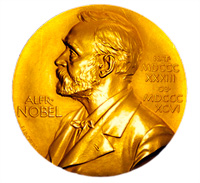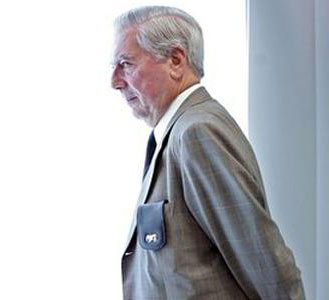 Giải Nobel Văn Chương năm 2010 thật bất ngờ được trao cho tiểu thuyết gia, ký giả kiêm chính trị gia Mario Vargas Llosa, một người cũng nổi tiếng không kém trong sự nghiệp chính trị.
Giải Nobel Văn Chương năm 2010 thật bất ngờ được trao cho tiểu thuyết gia, ký giả kiêm chính trị gia Mario Vargas Llosa, một người cũng nổi tiếng không kém trong sự nghiệp chính trị.
Trước khi kết quả giải Nobel Văn Chương năm nay được loan báo, nhà văn Mario Vargas Llosa không phải là một ứng viên được chú ý nhiều, khi những dự đoán đều đổ dồn về những cây bút của Nam Triều Tiên, Kenya và Hoa Kỳ. Và ủy ban chấm giải Nobel cũng không vì thế mà bị sứt mẻ uy tín chút nào khi chọn những nhà văn là chính trị gia.

Giải Nobel Văn Chương 2010 được trao cho tiểu thuyết gia, ký giả kiêm chính trị gia người Peru Mario Vargas Llosa [Hình: AP]
Viện Hàn Lâm Thụy Điển đã vinh danh nhà văn 74 tuổi về điều được gọi là “sự phác họa của ông về cơ cấu quyền lực và những hình ảnh sắt thép của sự đối kháng của những cá nhân, nổi dậy và thua bại”.
Những tác phẩm đầu tiên gây chấn động của ông bắt đầu xuất hiện vào thập niên 1960. The Time of Hero, tiểu thuyết được coi như một phần tự truyện xuất bản năm 1963, lấy bối cảnh giữa những sinh viên sỹ quan tại một trường võ bị ở Lima.
Ông đã viết cuốn Conversation in the Cathedral khi vừa qua sinh nhật 30 tuổi, một thành quả ngoại hạng trong sự nghiệp văn chương của ông, trong đó vai chính theo dõi sự can dự của người cha trong vụ giết một tay băng đảng khét tiếng của Peru, và trong tiến trình theo dõi đó nhân vật chính đã biết được chính quyền độc tài của quốc gia này bằng cách nào mà họ duy trì được quyền lực.
Là một cây bút đầy sức sáng tác phong phú và hăng hái khai phá nhiều thể loại, các tiểu thuyết của Vargas Llosa bao gồm từ các tác phẩm về lịch sử, những chuyện chính trị giật gân, cho đến cả hài hước lẫn những câu chuyện giết người bí ẩn.
Giống như người trước đây từng là bạn của ông và hiện cùng là khôi nguyên giải Nobel, ông Gabriel Garcia Marquez, một người mà theo tin cho biết, đã bị ông đánh vào năm 1976 vì những lý do gì mà cả hai cùng giữ kín không cho ai biết.
Ông Vargas Llosa là một chính trị gia hăng hái tích cực hoạt động. Lúc đầu ông là một ủng hộ viên cho cuộc cách mạng Cuba do Fidel Castro lãnh đạo, nhưng sau đã thất vọng với chủ nghĩa cộng sản và năm 1990 ra tranh cử tổng thống trong tư cách chủ tịch liên minh trung hữu Frente Democratico.
Giải thưởng Nobel sẽ được chính thức trao tặng trong một nghi lễ tổ chức tại Stokholm, Thụy Điển và Oslo, Na Uy vào ngày 10 tháng 12, đúng ngày ông Alfred Nobel từ trần năm 1896, người đã sáng lập ra giải thưởng này. Danh tính người được chọn cho giải Nobel hòa bình năm nay sẽ được công bố vào thứ Sáu tại Oslo.
Source: Kevin Billinghurst

Mario Vargas Llosa:
Nobel committee appreciates what authorities didn’t always
Mario Vargas Llosa, the Peruvian writer and literary giant in the Spanish-speaking world, was awarded the 2010 Nobel Prize in Literature, the Swedish Academy announced Thursday.
Vargas Llosa, 74, whose body of work includes more than 30 novels, essays and plays, is the first South American writer to win the coveted prize since Gabriel García Márquez, the Colombian storyteller who is much better known in the English-reading world than Vargas Llosa. García Márquez won in 1982.
In part because of the spotlight García Márquez drew to South American literature, Vargas Llosa’s best-selling work has been widely translated in English, French, Swedish and German.
Like many Nobel laureates, Vargas Llosa has written works that his country’s authorities didn’t appreciate. “The Time of the Hero,” released in 1963, described some of his harsh experiences in a military academy, and school officials burned 1,000 copies.
In their tribute to Vargas Llosa, the Swedish Academy cited a theme of “the individual’s resistance” in announcing the honor.
The prize was given, officials said in a statement, “for his cartography of structures of power and his trenchant images of the individual’s resistance, revolt and defeat.”
When a representative of the academy reached Vargas Llosa on Thursday morning, the newly minted laureate sound surprised and reflective. “Writing has been such a fantastic pleasure for me all my life that I cannot believe that I am honored and recompensed for something that has been a recompense in itself, you know?” he said in a transatlantic phone conversation.
Some of his best-known works include “The Green House,” “Conversation in the Cathedral,” “Aunt Julia and the Scriptwriter,” “A Fish in the Water: A Memoir,” “The Feast of the Goat” and “The Storyteller.” He has been praised for his unblemished examination of hypocrisy, most often training an eye on Peruvian society and politics. But he has also produced humorous work and detective stories.
Vargas Llosa, who was born in Arequipa, Peru, spent some of his early years in Bolivia, but his family returned to Peru in 1946.
His ambitions to be a writer were opposed by his father, who sent him to military school.
Leaving Peru for a while, Vargas Llosa worked as a language teacher and journalist in France. When he returned, he became heavily involved in the country’s politics and in 1990 became a candidate for president. He lost in a runoff and returned to writing.
In the phone conversation Thursday, Vargas Llosa discussed what writers should do. “I think writers are citizens, too, you know, and have the moral obligation to participate in the civic debate, in the debate about the solutions to the problems that societies face,” he said. “That doesn’t mean that I think that writers should become professional politicians. . . . I never wanted to become a professional politician. I did it once because the situation in Peru was deeply, deeply serious.”
His other honors include winning the Cervantes Prize in 1995, the highest literary honor in the Spanish-speaking world.
Vargas Llosa is teaching this semester at Princeton University.
The announcement continues the drought for American writers. No American has won the literature prize since novelist Toni Morrison in 1993.
Source: Jacqueline Trescott
Washington Post | October 8, 2010










































